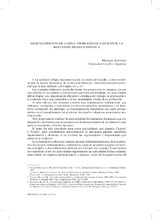Abastecimiento de carne. Problemática durante la Baja Edad Media hispánica
Autor
Zapatero, Mariana
Editor
Facultad de Filosofía y Letras. Departamento de Ciencias de la Antigüedad y Edad MediaFecha
2006Materia
Edad MediaCarne
Alimentación
Mataderos
METS:
Mostrar el registro METSPREMIS:
Mostrar el registro PREMISMetadatos
Mostrar el registro completo del ítemResumen
Durante la Baja Edad Media hispánica, la economía dirigida era la propia del ámbito municipal, en tanto el concejo creó una organización institucional que protegía y controlaba el desarrollo comercial y los diversos procesos económicos. Sin embargo, la documentación manifi esta una variedad de problemas en el cumplimiento satisfactorio de dichos objetivos comerciales. La intervención concejil se hacia efectiva a través de la reglamentación y control de la totalidad de la comercialización de productos, pero este tipo de economía imponía restricciones que, tal vez nos preguntamos, si en ocasiones no contradecían los mismos resultados de buen aprovisionamiento que pretendían alcanzar. En particular, proponemos un primer análisis de la realidad bajomedieval española considerando la multiplicidad de ejes dinámicos que expliquen los problemas en el abastecimiento de la carne, tales como las dificultades coyunturales de los siglos XIV y XV y las peculiaridades regionales. During the Later Hispanic Middle Age, the directed economy was the own one of the municipal scope, whereas the council created an institutional organization that protected and controlled the commercial development and the diverse economic processes. Nevertheless, the documentation shows a variety of problems towards the satisfactory fulfillment of these commercial objectives. The concejil intervention were carried into effect through the regulation and control of the totality of the product commercialization, but this type of economy imposed restrictions that, perhaps we ask ourselves, if sometimes they did not contradict such results of good supply that they tried to reach. Particularly, we propose a first analysis of the Spanish low-medieval reality considering the multiplicity of dynamic axes that explain the problems in the supply of meat, such as the conjunctural diffi culties of centuries XIV and XV and the regional peculiarities.

